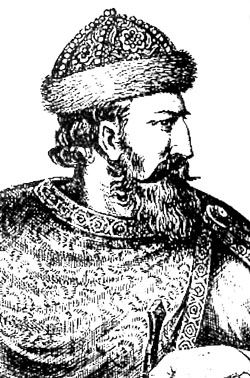Look up Roman in Wiktionary, the free dictionary.
Roman is a masculine given name meaning from Rome, which originated within the Roman Empire, via Latin. In its initial sense, the title "Roman", ( Romanus in Latin and Romanos in Greek) denotes a member of the Roman Empire, or belonging to or identifying with Roman (or Byzantine) culture. [1] [2] It most likely evolved from Romulus, the legendary co-founder of Rome. [3]
Contents
 Roman the Great, Grand Prince of Kiev | |
| Gender | Male |
|---|---|
| Origin | |
| Word/name | Latin |
| Meaning | Being Roman, belonging to the Roman/"Byzantine" Empire or From Rome |
| Region of origin | Europe |
| Other names | |
| Alternative spelling | Cyrillic: Роман. Román, Romão, Romain |
| Variant form | Female form Romana |
| Related names | Romulus, Romanus, Romanos, Romano, Romeo, Rodman |
Due to Byzantine cultural influence the name Roman (the Slavic variant of Romanos/Romanus) is widely used amongst Eastern and Western Slavs. The name day for Roman varies between countries. Román in Spanish is a popular given name in Spanish-speaking countries, especially in Latin-America.
Variations of the name include:
- Catalan: Romà
- French: Romain
- German: Roman
- Hungarian: Román
- Italian: Romano
- Latvian: Romāns
- Portuguese: Romão
- Spanish: Román
- Greek: Ρωμανός
- Polish, Czech, Slovak: Roman
- Romanian: Roman
- Russian, Ukrainian: Роман (Roman)
- Belarusian: Раман (Raman)
Roman may refer to: